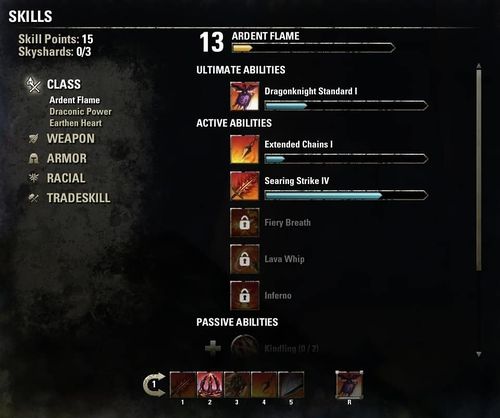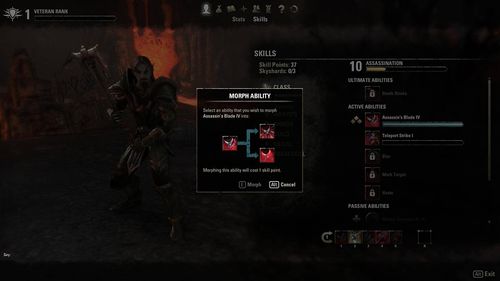General:Creating ESO: Designing Skill Lines
The original article was posted here on December 4, 2013.
Is your character a Sorcerer in the Mages Guild who wades into the melee wearing heavy armor and tossing fireballs? A Dragonknight who has mastered the bow and keeps allies alive from range with a restoration staff? A master provisioner? No matter what you have envisioned for your character, you'll use skill lines to define many of his or her capabilities.
If you saw our recent video about character progression, you have an idea about how skill lines work, but we'd like to take you a little deeper and explore how we designed this system, the choices we had to make, and what factors we've considered throughout development.
Why Skill Lines?[edit]
Being both an Elder Scrolls game and an online RPG, we've faced some unique challenges. In Elder Scrolls games, your character can do anything—and, after much adventure, almost everything. In multiplayer games, though, it can be important to stand out from the crowd. How would we preserve a distinct Elder Scrolls feel but give still everyone the opportunity to develop an identity?
You'd probably recognize some of the early systems we tried, but more traditional systems just weren't meeting the goals we had in mind. We needed to provide the broad range of options that Elder Scrolls fans expect. Over time, we started to recognize ways we could tie everything together and satisfy both of these objectives.
We know what fans have come to anticipate from an Elder Scrolls game. We wanted you to be able to pick up and use any kind of weapon or armor, and to have lots of ways to approach various situations. We wanted you to feel rewarded for exploring the world and to offer the things you expect as an Elder Scrolls fan, like the ability to join NPC guilds, become a vampire or werewolf, and to be able to create your own weapons, armor, potions, enchantments, or food.
By making many of these activities into their own skill lines, we can give your character that broad range of options. As an added benefit, more options mean your choices have more impact. When you gain a skill point, you can put it into any skill line that's available to you. Every skill point is a chance for you to define your character and to choose to specialize or branch out and give something new a try.
Classes[edit]
A question we often see is, "Why not go classless?" In the end, keeping class skill lines exclusive while opening many other skill lines to everyone worked best—choices stay important, but everyone has freedom to choose from a large pool of options. It helps us encourage diversity while still providing choices, and it allowed us to emphasize multiplayer strategy—members of the different classes have access to their own skill lines, which creates opportunities for you to work with your allies, coordinating your unique skills and adding depth and variety to team gameplay.
Your class is an important decision to make, but it doesn't chain you to any one playstyle. Every class has three of its own skill lines, each with different skills that are thematically related to the class. Combine those three with the many, many other lines available to every character, and each member of a particular class can be wildly different from the next. If you don't want to, you don't have to spend a single point in your class lines. However, you'll know when you see a Templar who has decided to focus on his or her class abilities.
Exploration[edit]
Something else the skill line system allowed us to do was reward you for engaging in the world. Exploration is, of course, a huge element of The Elder Scrolls series, and it has always been important to us to reward it appropriately. There are several ways we've tied in exploration to progression through skill lines.
First off, there are skill lines that you don't start the game with that can be discovered in the world. Some, like the Fighters or Mages Guilds, aren't difficult to find, but others are less straightforward.
We've also hidden Skyshards throughout Tamriel that reward you with additional skill points. We loved the Dragon Words from Skyrim, and it inspired us to implement something that encouraged exploration in the same way. And, of course, books are very important. If you've played other Elder Scrolls games, you know to expect more than just lore from books, and we carry on that tradition in ESO. Like in Skyrim, there are tons of books in the world that teach you a new rank in a specific skill line when you read them.
The skill lines you'll gain during your adventures offer new options, too. We decided to make conversational abilities part of these guild lines—you can choose to learn Persuade as a member of the Mages Guild and Intimidate in the Fighters Guild. These two abilities present new decisions: at the cost of a skill point, they open up new dialogue options. You won't always be able to persuade or intimidate someone, but when you can, you'll see the investment you made pay off—and you'll be able to express your character's personality.
Morphing[edit]
Many of the best ideas in game development come from late-night, coffee-fueled discussions, and one of the even deeper customizations in the skill line system came from just such a session, when one of our developers asked the revelatory question, "What if our skills ... evolved?" This is where ability morphing came from, and it stuck as another choice you'll get to make. Once you've used a particular ability enough, you'll be asked to morph it—to choose between two paths, each of which add something new to that ability. We think you'll like it.
But What About...?[edit]
There's still a lot to consider, and something we always keep in mind is the possibility that so many options might be overwhelming. We don't want anyone to feel punished for making a decision that didn't turn out as expected, and we want you to experiment, try different skill lines, and find your favorites. You'll be able to reset your skills, giving you room to try new things or undo choices you aren't happy with.
We're also aware that there are players who want to discover optimal builds, and one of our goals is to make sure there are multiple "right" paths. Because you can change your hotbar configurations any time you're not in combat, every character will have flexibility, too. This lets you change your approach or even your role if something isn't working out. We think that you'll find there are many answers to the challenges you'll face while exploring, crushing through dungeons with friends, or facing your enemy alliances in Cyrodiil.
We can't wait to see the builds you'll come up with, and it's our hope that skill lines will provide you with the tools you need to build your character exactly the way you want. As you can see, we've put a great deal of effort into bringing you a progression system that fits the Elder Scrolls game world we're creating.
Thanks for reading; we hope you enjoyed this look behind the development of skill lines. Keep your eyes open for the next Creating ESO!




